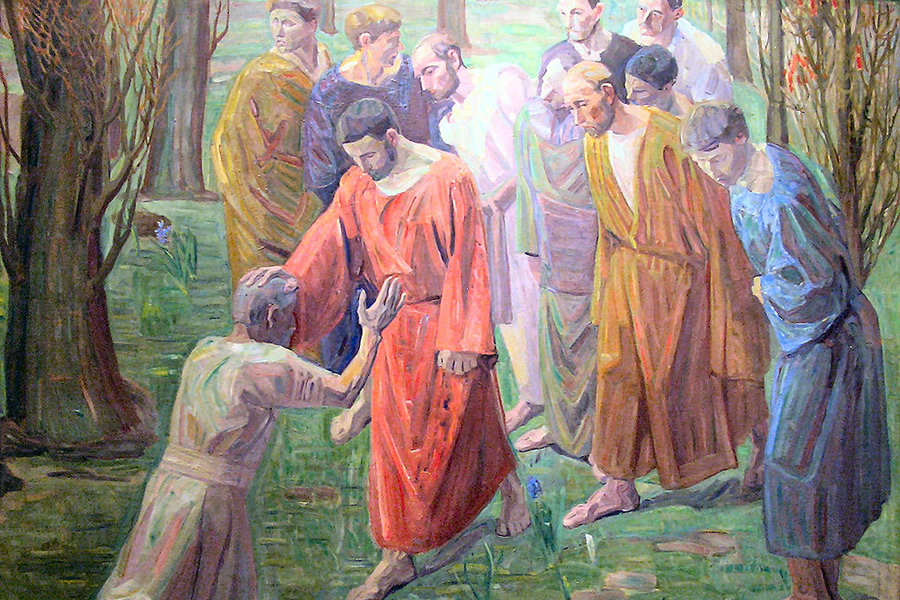St. Francis of Assisi Weekly Reflections

Seek and You Will Find
07-27-2025Weekly ReflectionWe Celebrate Worship Resource, Vol. 49, No. 1Proving that it never hurts to ask, Abraham repeatedly asks God how many innocent people would there have to be in a city to change God's mind about destroying it. It appears Jesus would agree with this approach as well, as he gives an example of a desperate person awakening a friend's entire household at midnight to ask for three loaves of bread.
That God welcomes persistent requests at any hour is reassuring, but perhaps there is more to be learned here. By effectively asking God to show greater and greater mercy by progressively lowering the number of innocent by standards, Abraham learns that God is indeed much more merciful than he originally thought. More creative, too.
After all the examples Jesus gives of asking and receiving, he tells his disciples that the Father will give the Holy Spirit to those who ask. Who would have ever thought to ask for the third person of the Trinity? Perhaps Jesus is trying to teach his disciples and us that God answers our prayers in ways both unimaginable and overwhelming.
When we ask for "our daily bread" and "forgive us our sins," God gives us living bread and eternal redemption. No, indeed, it never hurts to ask.
What do you look for as an answer to your prayers?
-We Celebrate Worship Resource, Vol. 50, No. 3
Busca Y Encontraras
Demostrando que nunca está de más pedir, Abraham le pregunta repetidamente a Dios cuántas personas inocentes tendría que haber en una ciudad para que Dios cambiara de opinión sobre destruirla. Parece que Jesús también estaría de acuerdo con este enfoque, ya que da el ejemplo de una persona desesperada que despierta a toda la casa de un amigo a medianoche para pedirle tres panes.
Que Dios reciba peticiones persistentes a cualquier hora es reconfortante, pero quizás haya más que aprender aquí. Al pedirle a Dios con eficacia que muestre cada vez mayor misericordia, reduciendo progresivamente el número de inocentes según los estándares, Abraham aprende que Dios es, de hecho, mucho más misericordioso de lo que originalmente creía. Más creativo, también.
Después de todos los ejemplos que Jesús da de pedir y recibir, les dice a sus discípulos que el Padre dará el Espíritu Santo a quienes lo pidan. ¿Quién hubiera pensado en pedir a la tercera persona de la Trinidad? Quizás Jesús intenta enseñarles a sus discípulos y a nosotros que Dios responde a nuestras oraciones de maneras inimaginables y abrumadoras.
Cuando pedimos "nuestro pan de cada día" y "perdónanos nuestros pecados", Dios nos da el pan vivo y la redención eterna. No, de hecho, nunca está de más pedir.
¿Que buscas como respuesta a tus oraciones?
-We Celebrate Worship Resource, Vol. 50, No. 3
Daily Prayer
07-27-2025Question of the WeekReading I Genesis 18:20-32 . Abraham intercedes for Sodom
Reading II Colossians 2:12-14 . Sovereign role of Christ
Gospel Luke 11:1-13 . The Our Father
Key Passage: Jesus said, "So I say to you, Ask, and it will be given you; search, and you will find; knock, and the door will be opened for you." (Lk. 11:9)
Adults: Have your most recent prayers been prayers of praise, petition, or sorrow? Which kind of prayer do you need to practice more often?
Kids: What are you most thankful for right now?
Oracion Diaria
Lectura I Génesis 18:20-32 . Abraham intercede por Sodoma
Lectura II Colosenses 2:12-14 . El rol soberano de Cristo
Evangelio Lucas 11:1-13 . El Padrenuestro
Pasaje Clave Jesús dijo: "Por eso les digo: Pidan, y se les dará; busquen, y encontrarán; toquen, y se les abrirá" (Lc. 11:9).
Adultos: ¿Tus oraciones más recientes han sido de alabanza, petición o tristeza? ¿Qué tipo de oración necesitan practicar con más frecuencia?
Niños: ¿De qué estas más agradecidos ahora mismo?

Unexpected Encounters with Jesus
07-20-2025Weekly ReflectionWe Celebrate Worship Resource, Vol. 49, No. 1Abraham does not realize that he is encountering the Lord when he welcomes three traveling strangers that hot afternoon. He invites them to eat, drink, and rest, providing hospitality above and beyond what was expected in his culture. Only after one of the visitors tells him that his elderly wife Sarah will bear a son does Abraham realize who they are.
Similarly, Paul had certainly not expected to encounter the Lord on his way to Damascus to arrest more Christians. But after the risen Lord reveals himself, he tells Paul that he has chosen him to proclaim his name to all people, Jews and Gentiles alike, and to reveal the "mystery hidden from ages and from generations past": that salvation is offered to all, that all may be perfect in Christ (Colossians 1:26).
Mary may have known of Jesus when her sister Martha welcomed him into their home, but the way he holds her spellbound suggests that she had not anticipated such a powerful encounter with him. On any given day we too may be surprised when we encounter the Lord, whether in prayer, in God's word, in our neighbor in need, or in the Eucharist.
May we welcome him as well, choosing to spend time in his presence, for this is "the better part and it will not be taken from [us]" (Luke 10:42). When have you been surprised by the Lord's presence in a special way?
-We Celebrate Worship Resource, Vol. 50, No. 3
Encuentros Inesperados Con Jesús
Abraham no se da cuenta de que se encuentra con el Senor cuando le da la bienvenida a tres extraños que viajan esa tarde calurosa. Los invita a comer, beber y descansar, proporcionando hospitalidad mas allá de lo esperado en su cultura. Solo después de que uno de los visitantes le dice que su anciana esposa Sarah tendrá un hijo, es que Abraham se da cuenta de quiénes son.
Del mismo modo, Pablo ciertamente no había esperado encontrarse con el Senor en su camino a Damasco para arrestar a más cristianos. Pero después de que el Señor resucitado se revela, le dice a Pablo que lo ha elegido para que proclame su nombre a todas las personas, judíos y gentiles por igual, y que revele el "misterio que había estado oculto desde los siglos y edades": que la salvación es para todos, que todos pueden ser perfectos en Cristo (Colosenses 1:26).
María puede haberlo sabido de Jesus cuando su hermana Marta lo recibió en su casa, pero la forma en que mantiene su atención sugiere que no había anticipado un encuentro tan poderoso con el. En cualquier día determinado, nosotros tambien podemos sorprendernos cuando nos encontramos con el Senor, ya sea en oracion, en la Palabra de Dios, en nuestro prójimo necesitado o en la Eucaristía.
Que podamos darle la bienvenida también, eligiendo pasar tiempo en su presencia, ya que esta es "la mejor parte y la cual no le será quitada" (Lucas 10:42). ¿Cuando te ha sorprendido la representación del Señor de una manera especial?
-We Celehrate Worship Resource, Vol. 50, No. 3

Live the Law of Love
07-13-2025Weekly ReflectionWe Celebrate Worship Resource, Vol. 49, No. 1When we hear the word love, we tend to think of the tender feeling we have for our spouse or significant other or those closest to us. But Jesus reminds us today that love is much more than a feeling. Love requires doing. After Jesus affirms that in order to inherit eternal life we must love our neighbor as ourselves, the lawyer asks, "And who is my neighbor?" (Luke 10:29).
In his story of the good Samaritan, Jesus clearly broadens the concept of neighbor, which at the time it was used in the Torah-"You shall love your neighbor as yourself" (Leviticus 19:18)-was thought to mean one's fellow Israelite. But he also broadens the concept of love.
Yes, Jesus says that the Samaritan feels compassion, but he goes into much greater detail about everything the Samaritan does out of love: stopping and approaching the injured man, treating and bandaging his wounds, lifting him up on his animal, taking him to an inn, caring for him all through the night, and paying the innkeeper generously.
This is what love really is. This is how we love our neighbor and love God.
What will you do this week to put love for someone else into action?
-We Celebrate Worship Resource, Vol. 50, No. 3
Vivan la Ley del Amor
Cuando escuchamos la palabra amor, solemos pensar en el tierno sentimiento que sentimos por nuestro cónyuge, pareja o seres queridos. Pero Jesús nos recuerda hoy que el amor es mucho más que un sentimiento. Amar requiere acción. Después de que Jesús afirma que para heredar la vida eterna debemos amar a nuestro prójimo como a nosotros mismos, el intérprete de la ley pregunta: "¿Y quién es mi prójimo?" (Lucas 10:29).
En su historia del buen samaritano, Jesús amplía claramente el concepto de prójimo, que en su época se usaba en la Torá: "Amarás a tu prójimo como a ti mismo" (Levítico 19:18), se pensaba que se refería a nuestro compatriota israelita. Pero también amplía el concepto de amor.
Sí, Jesús dice que el samaritano siente compasión, pero detalla mucho más todo lo que hace por amor: detenerse y acercarse al herido, curar y vendar sus heridas, subirlo a su caballo, llevarlo a una posada, cuidarlo toda la noche y pagar generosamente al posadero.
Esto es realmente el amor. Así es como amamos al prójimo y a Dios.
¿Qué harás para ayudar a manifestar el reino de Dios en este mundo?
-We Celebrate Worship Resource, Vol. 50, No. 3
Acting with Mercy
07-13-2025Question of the WeekReading I Deuteronomy 30:10-14 . God's command is clear
Reading II Colossians 1:15-20 . Christ's fullness and reconciliation
Gospel Luke 10:25-37 . The good Samaritan
Key Passage: But a Samaritan, while traveling, came near him; and when he saw him, he was moved with pity. He went to him and bandaged his wounds, having poured oil and wine on them. Then he put him on his own animal, brought him to an inn, and took care of him. (Lk. 10:33-34)
Adults: When have you gone out of your way to help a stranger in need?
Kids: Would you help a new student who needed help? Why or why not?
Actuando con Misericordia
Lectura I Deuteronomio 30:10-14 · El mandato de Dios es claro
Lectura II Colosenses 1:15-20 . La plenitud y reconciliacion de Cristo
Evangelio Lucas 10:25-37 . El buen Samaritano
Pasaje Clave: Un samaritano que iba de viaje se acercó a él, y al verlo, se compadeció. Se acercó, le vendó las heridas, echándoles aceite y vino. Luego, lo montó en su propia cabalgadura, lo llevó a una posada y lo cuidó. (Lc. 10:33-34)
Adultos: ¿Cuándo te has esforzado por ayudar a un extraño necesitado?
Niños: ¿Ayudarías a un estudiante nuevo que necesitara ayuda? ¿Por qué sí o por qué no?
Accepting the Christian Message
07-06-2025Question of the WeekReading I Isaiah 66:10-14c . Mother Zion
Reading II Galatians 6:14-18 . The Cross, our true boast
Gospel Luke 10:1-12, 17-20 or 10:1-9 · Mission of the 72
Key Passage: Jesus said to the disciples, "Whenever you enter a town and they do not welcome you, go out into its streets and say, 'Even the dust of your town that clings to our feet, we wipe off in protest against you. Yet know this: the kingdom of God has come near.'" (Lk. 10:10-11)
Adults: Where do you see the message of Christian faith being rejected in the world today? What is your response to that?
Kids: What can you do when you are generous with others, and they do not want what you give them?
Aceptando el Mensaje Cristiano
Lectura I Isaías 66:10-14c . Madre Sion
Lectura II Gálatas 6:14-18 . La Cruz, nuestra verdadera gloria
Evangelio Lucas 10:1-12, 17-20 o 10:1-9 · Mision de los 72
Pasaje Clave: Jesús dijo a sus discípulos, "En cualquier ciudad donde entres y no te reciban, sal a sus calles y di: 'Hasta el polvo de su ciudad que se pega a nuestros pies, nos lo sacudimos en protesta contra ustedes; pero sepan esto: que el reino de Dios se ha acercado.'" (Lc. 10:10-11).
Adultos: ¿Donde ves que se rechaza el mensaje de la fe cristiana en el mundo actual? ¿Cuál es tu respuesta a esto?
Niños: ¿Qué puedes hacer cuando eres generoso con los demás y ellos no quieren lo que les das?

The Laborers are Few
07-06-2025Weekly ReflectionWe Celebrate Worship Resource, Vol. 49, No. 1The harvest is abundant," Jesus begins, likely sending feelings of joy and anticipation rippling through the gathering (Luke 10:2). "But the laborers are few," he continues, "Behold, I am sending you like lambs among wolves" (10:2-3). That puts a damper on things! Then he sends them off on this daunting work with nothing more than the clothes on their backs.
But he has given them something much greater than what they could put in a money bag or sack: the power to proclaim that the kingdom of God is near. Indeed, they return rejoicing, having cured the sick and driven out demons. These are truly signs of the kingdom. We are those laborers for the kingdom now. We can bring peace to our households by offering forgiveness and understanding. We can heal suffering by giving comfort and care to those in need.
We can drive out the demons of sin, injustice, and oppression when we work to defeat them. It is not easy. Saint Paul attests to that when he says that he bears the marks of Jesus on his body. But the reward is great, for the power of Jesus' cross, of which Paul boasts, makes God's harvest of souls into the kingdom abundant.
What will you do to help manifest the kingdom of God in this world?
-We Celebrate Worship Resource, Vol. 50, No. 3
Los Obreros son Pocos
La cosecha es abundante", comienza Jesús, probablemente infundiendo alegría y anticipación en la reunión (Lucas 10:2). "Pero los obreros son pocos", continúa, "iMiren, los envío como corderos en medio de lobos!" (10:2-3). ¡Eso empaña las cosas! Luego los envía a esta ardua tarea con solo la ropa que llevan puesta.
Pero les ha dado algo mucho mayor de lo que podrían meter en una bolsa o un costal: el poder de proclamar que el reino de Dios está cerca. De hecho, regresan gozosos, tras haber curado a los enfermos y expulsado demonios. Estas son verdaderas señales del reino. Nosotros somos esos obreros del reino ahora. Podemos traer paz a nuestros hogares ofreciendo perdón y comprensión. Podemos sanar el sufrimiento brindando consuelo y cuidado a los necesitados.
Podemos expulsar los demonios del pecado, la injusticia y la opresión cuando nos esforzamos por vencerlos. No es fácil. San Pablo lo atestigua cuando dice que lleva las marcas de Jesús en su cuerpo. Pero la recompensa es grande, pues el poder de la cruz de Jesús, del que Pablo se jacta, hace abundante la cosecha de almas de Dios para el reino.
¿Qué harás para ayudar a manifestar el reino de Dios en este mundo?
-We Celebrate Worship Resource, Vol. 50, No. 3